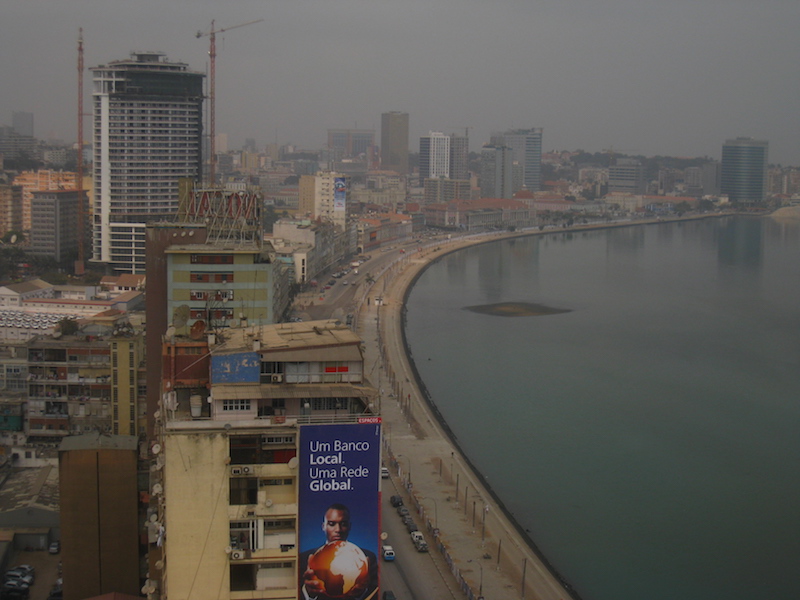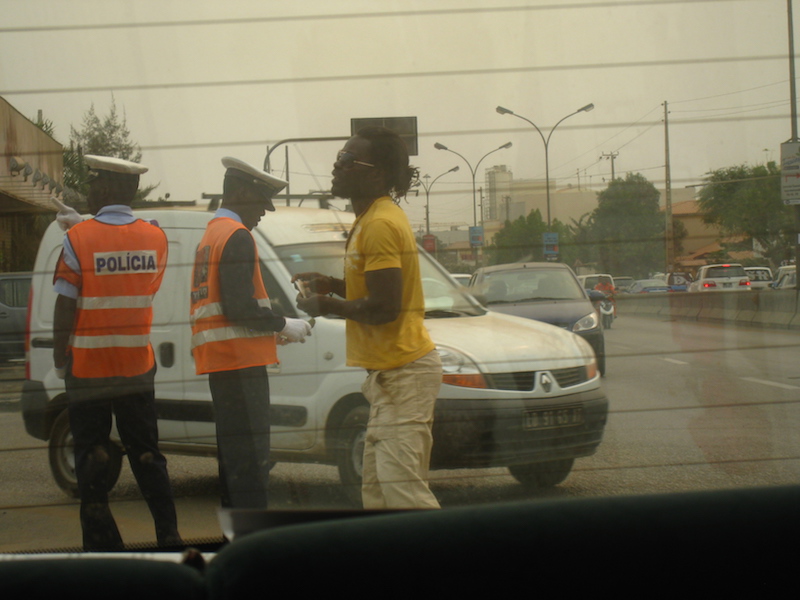A little known fact; for foreigners, Luanda is the most expensive city in the world. While most Angolans live in poverty, expatriates pay upwards of $15-20,000 a month to rent a 3BR house. A moderate dinner typically costs $100 per person, and a 3-star hotel room will run at least $300 a night.
Yikes. When I wasn’t waiting in traffic, I spent most of my time in Luanda marveling at the prices. Of strawberry jam, of meat and toilet paper and motor oil. All very, very expensive.

I wish I knew more about history and economics to be able to explain why prices are so high. I read that during the Angolan Civil War (1975-2002), families thronged to Luanda. It was farther away from the fighting. The large surge in population put stress on the city. The government–getting rich from oil and diamond revenue–has since heavily invested in Luanda infrastructure. Like Dubai just a few years ago, cranes poke out of the skyline. New roads are lain, even a new airport is under construction. Unlike Dubai, however, Luanda isn’t nearly as organized. There’s government corruption. Many of the buildings are broken. Sidewalks are puddled and attract malaria-carrying mosquitoes.
Street Entrepreneurship
The traffic is abysmal. Not as bad as Lagos, Nigeria, but close. Idled in the city’s cramped streets, a thick layer of carbon monoxide hangs in the air. Hawkers meander from car to car, selling anything and everything. Mouse pads, air freshener, cold sodas, clocks, mini-violins, toilet seats, hats, socks and pirated DVDs. Hustling in the finest sense of hustling there is. It’s a wild scene. Just off the streets lie barbed wire, scaffolding, dust, trash and exposed sewers, indicators of a city that’s running too fast for it’s own good. In the distance, ratty soccer goals line the sandy shore. At the end of Ilha de Luanda, a skinny and posh peninsula that juts out from the center of the city, an oil rig stands tall.
More Bribing
One afternoon, I helped my driver pay off the police to get out of a traffic violation.

Side Trip to Soyo
This particular cost-of-living study required a few nights in Soyo, a small city at the northwestern-most part of the country, bordering the Democratic Republic of Congo.
Accommodation at one of our client’s oil camps had been arranged. The first afternoon, I was asked to participate in a mandatory site orientation. Ben, a large man who spoke in a slow, southern drawl, outlined the camps facilities. “They have a big incinerator there, sometimes it work, sometimes it don’t.” Ben mentioned that over 1,000 snakes had been relocated from the camp over the last year. Forest and black spitting cobras, gaboon vipers, and Jameson’s mambas. Not to mention the killer bees, wasps, scorpions and spiders. I made sure to stay on the path.
I was escorted around town by several of the expatriate wives. They’re probably the most hardcore foreign workers I’ve ever met. These women have lived all over the world, for years, in places like Kazakhstan and Nigeria. One of them took me through Soyo’s largest outdoor market.
At first, Angola was slow to issue me a visa–my first passport picture was deemed too “inappropriate.” (I had apparently exposed too much chest?) I’m glad they decided to let me in. What a week.
Awesome video. Looks like a pretty wild place to visit.
The price you mention for a 3 BR house is outrageous. I can’t even understand that. Do you remember any specific prices for little things? Such as jam, toilet paper, motor oil…
Cool post man. And make sure to keep that manly chest of yours concealed at all times.
Digging the design as well!
Good question. I remember seeing $12/13 for a regular sized jar of strawberry jam. Most of the time. So outrageous!
Those prices seem a little ridiculous given the economic condition of the country. I remember holding my breath making purchases in Oslo and Tokyo, and so I’m sure Luanda would have me running for the border.
So are expat salaries actually elevated there? Would an N.American or European expect a greater salary there as opposed to home?
They absolutely are. That’s the purpose of my research, really, to collect data for cost-of-living adjustments.
While every company has its own expatriate compensation policy, in order to justify relocation to a place like Luanda, salary and benefits are almost certainly elevated.
haha that’s good…otherwise I would be holding my breath if my company told me to head off to Luanda :p
I just discovered your blog and enjoying your posts and ideas. If you don’t mind, I want to include the PMBA idea on my blog to pass some good readings to my readers…ages 25-35yrs. Thanks for the tip!
Wow, weird place. And certainly great to visit… for a couple of days at least. I’m not a video fan, but this one was great… 20 secs more next time, please! 😉
Agreed! I could have used 20 more seconds myself. Thanks for chiming in, Fabian.
I remember hearing about how expensive everything is in Kigali, Rwanda and I was blown away. But the prices there are nothing compared to what you’ve mentioned about Luanda.
The chest thing is interesting. I might think about getting some more conservative passport photos for the Middle East!
Hi Alan, we hardcore wives here in Soyo thank you for the plug on your blog. We are the best kept secret on the expatriate circuit! It is the rainy season here and the market is totally under water now, so we are earning every penny of our hardship allowance. Come back and see us again sometime!
Mo! Thanks again for lugging me around town. What an interesting place to be an expat. Glad I caught the market before it flooded this season! When I said “hardcore,” I meant it. Keep up the good work, and hope your travels treat you well.
Hi Alan. Thanks for passing on Gene’s questions. I will write him/her? an email rather than bore your readers with the ugly truth. It was an absolute pleasure to lug you around town. New Year was quiet with almost everybody out of town. Pat and I took our fizzy down to the end of the road to listen to all the wonderful music going down in the local community. They love to party! Good luck with achieving your goals for 2011 and Happy New Year!
Alan,
First, thank you for publishing this blog!
Mo Cox,
I’m going through the visa process now and plan a site visit the week of January 31, 2011. Provided everything goes as imagined, I will move from Vancouver, USA to Soyo as a resident for a 3 year assignment.
The only real concern I’ve had is food. Your mention of a flooded market and other’s comments about how few markets there are indicate my concern is rational.
My question then is about food. My company has a generous move policy allowing me to bring about 5600 lbs of “stuff”. As I undestand it today, furnished housing is provided along with a food allowance.
I’ve been looking at grocery product shelf life (best by date) to produce a list of food to bring. It seems that 2 years is about the max shelf life for canned goods like corn, beans, etc.
I’ve been told by others who live in Luanda that they come home to shp each year and sent a container back loaded with enough for them and also for some pilfering as it moves through customs.
What food products would hardcore expat wives bring presuming they were in my shoes?
Thank you!
Gene, I need to know a little more of your circumstances in order to give the best advice. I will email you with follow-up information. Mo
This is unbelievable. Most of the people in Angola are starving. There is something wrong in this world. Some of this enormous amount of should be used for another areas of Angola.
Wow, thats expensive and I thought living in London was expensive. I will have second thought if I was ever transfered to Angloa with my job.